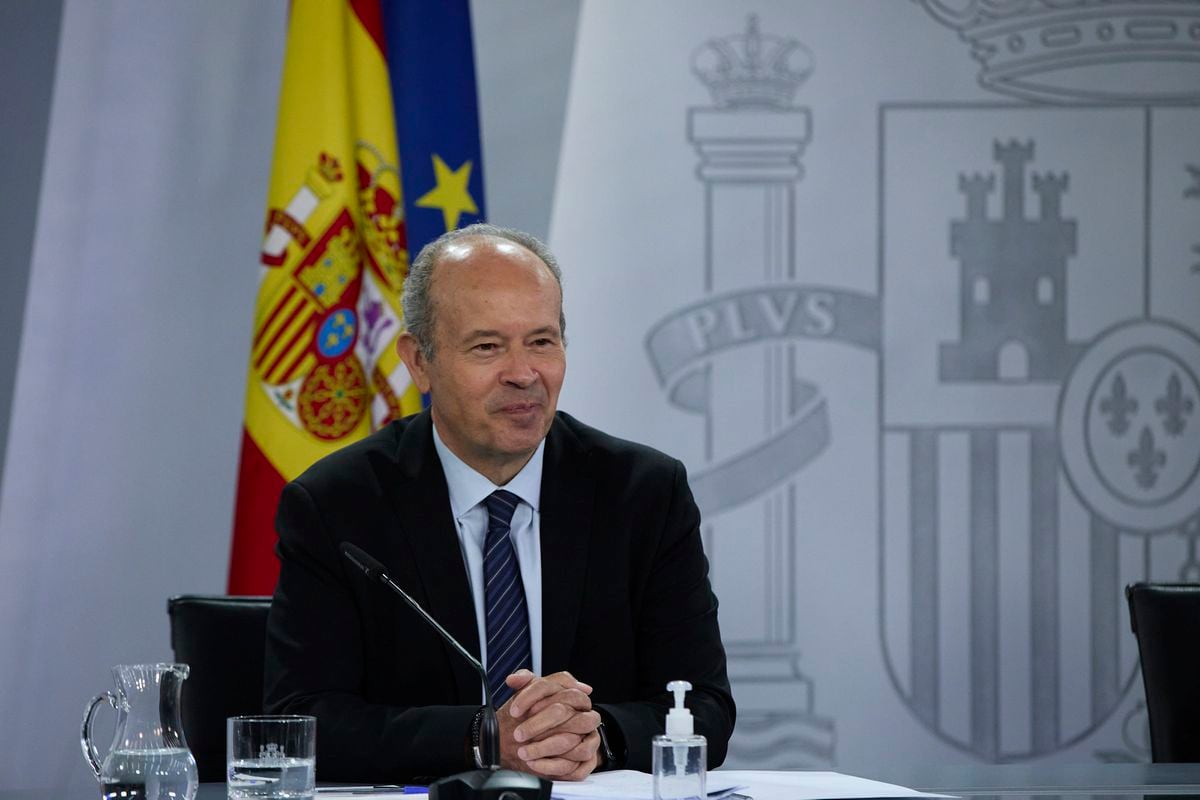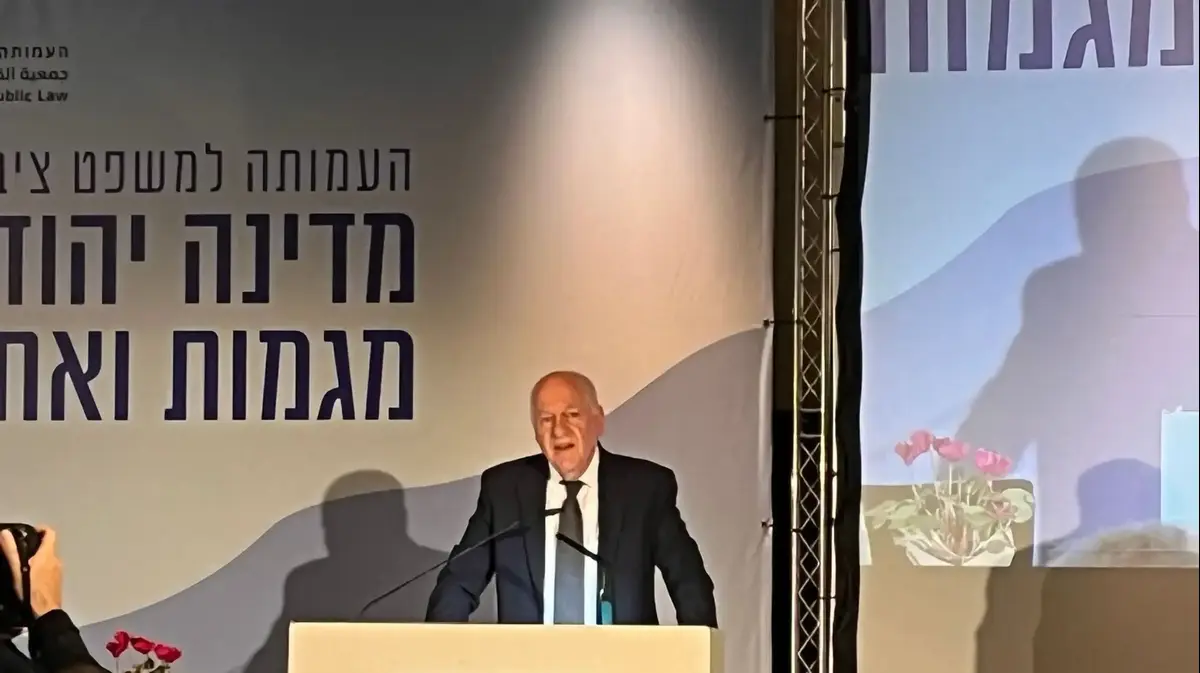The Government definitively yields and has announced this Tuesday that it will withdraw the bill that contemplates reducing the majority necessary to elect 12 members of the General Council of the Judiciary. The President of the Government parked the proposal last October as a gesture of goodwill to seek an agreement with the PP that would unblock the body - whose mandate expired in December 2018 - but, after the failure of the last negotiation, he had threatened to dust off that rule to promote renewal without PP. Now, however, it has decided to ask the two political groups that support the Government, PSOE and United We Can, to withdraw the text that they registered on October 14.
This was announced by the Minister of Justice, Juan Carlos Campo, at the press conference after the Council of Ministers, which approved the Draft Bill of Organizational Efficiency of the Public Justice Service. “I don't want us to waste a minute. He said of the president that those initiatives of parliamentary groups were frozen in order to change the majorities for the election of the council, now we were concerned about efficiency. To avoid the outbreaks, it will be proposed that the groups remove it so as not to give more fuel ”, explained Campo.
The minister has said that the Government "is going to urge" the two groups that support the Executive to renounce that proposal, but the PSOE partner is, for now, reluctant. Minutes after Campo's announcement, when he was still speaking at the press conference in La Moncloa, Jaume Asens, president of the United We Can parliamentary group, has shown his initial rejection of the measure: “We think that our proposal that provides for a of unblocking in the majorities for the election of the Council is the best alternative and as long as we are not offered a better one, we are not in favor of the withdrawal ", said Asens, who has asked the Minister of Justice to explain to them which option is offers them in return.
Campo's announcement comes a day after the virtual meeting he held with the European Vice President of Values and Transparency, Vera Jourová, who asked him to withdraw this legal reform and that the governing body of the judges be renewed as soon as possible, but in an agreed manner. Campo has assured to agree with that request. “Let's not get distracted by that. That was what I made him see yesterday [Jourová] ", said the head of Justice. The Government has already taken a step today and now expects the PP to take the next. “What is really important is that whoever is blocking the renewal take a step back and get ready to renew the constitutional bodies. It is urgent that we reach an agreement ”, said the minister, who hopes to find a meeting point for renewal“ immediately ”.
The P has celebrated the Government's announcement as its own success, and has shown itself open to negotiation, but without renouncing any of the conditions that have so far enshrined the renewal. “We will renew the constitutional bodies when Sánchez agrees to reinforce judicial independence and respect the separation of powers. I have been demanding this condition for two years as established by the Constitution and the Council of Europe. The one that blocks and degrades the institutions is the PSOE ”, wrote Pablo Casado on his Twitter account. The party's Justice spokesman, Enrique López, also on Twitter, has described the now-withdrawn legal reform as “complete nonsense, unconstitutional and anti-European”, which, according to López, “put the Government of Spain closer to Venezuela than to Venice ”. "The political pressure of the PP,the EU and the Spanish judges and magistrates have overcome a serious authoritarian and radical drive of the worst sanchismo ”, he added.
The government's decision to urge the withdrawal of the bill is "a gesture, especially symbolic," Campo has admitted, but the Executive maintains that it should serve to "help" the consensus around the new model of Justice. One of the pillars of this new model is the organizational efficiency law approved this Tuesday, which contemplates the creation of three figures: the Courts of Instance, the Judicial Office and the Justice Offices in the municipality. The first provides for the transformation of the current 3,718 single-person courts into 431 Courts of Instance, one per jurisdiction. The objective is to give priority to collegiate decision-making, which, according to the Government, will allow the introduction of more efficient management and organization formulas, such as the establishment of common criteria among the members of the court. What's more,the governing bodies of these courts will be elected by the judges in a participatory manner. In this sense, Campo has indicated that "it deepens the internal democracy of the Judicial Power" and "widens the opportunities for the participation of judges in their self-government." "Those who dedicate themselves to putting clubs in the wheel, now have fewer excuses not to pitch in," said the minister.
Regarding the Judicial Office, the law intends to allow its implementation throughout the territory to be promoted. In this sense, according to the Minister of Justice, with previous experience and with the technological investment derived from European funds, "it is possible to recondition the machinery at the service of the jurisdictional activity to take advantage of it to its full potential."
As for the Justice Offices in the municipalities “they are the evolution of the justices of the peace”, as explained by Campo. The objective is to bring Justice services to all parts of Spain for the population living in rural areas, in order to contribute to the fight against depopulation and advance in social and territorial cohesion. "This draft is more than a legislative reform, it is the basis for the transformation of Justice, to contribute to the country project," the minister concluded.



/cloudfront-eu-central-1.images.arcpublishing.com/prisa/VA3WQRJI66MMREDDI2GEEEHW7E.jpg)





